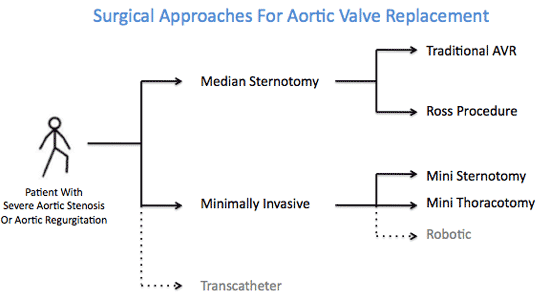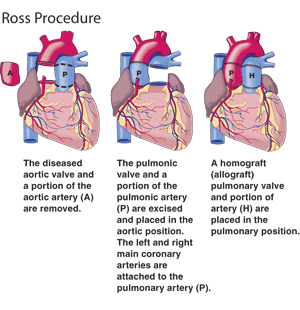“Why Didn’t You Get Minimally Invasive Valve Surgery?” Asks Anne
By Adam Pick on December 8, 2010
I just received a very appropriate question from Anne about minimally invasive approaches to heart valve surgery. Anne writes, “Adam – Like you, I was diagnosed with severe aortic stenosis. I need an aortic valve replacement. Why didn’t you get a minimally invasive surgery? Thanks, Anne”

This is an interesting question to answer considering (i) each patient case is unique and (ii) different surgical approaches may be more suitable for one patient relative to another. For me… On one hand, I was attracted to the benefits of minimally invasive procedures – less physical trauma, accelerated recovery time, shorter hospital stays, etc.
On the other hand, I wanted a very specific form of aortic valve replacement, known as the Ross Procedure or Switch Procedure, which required a median sternotomy. In this procedure, the pulmonary valve is removed and stitched into the aortic position. Then, a human donor valve (known as a homograft) is placed in the pulmonary position.

Like most things in life, there are trade-offs associated with any selection process. Selecting a valvular procedure is no different. Here are the trade-offs I encountered:
- I had a successful Ross Procedure BUT needed to have my sternum broken.
- I received a tissue valve replacement which does not require any post-operative medications (e.g. anticoagulants) BUT that valve is not as durable as a mechanical valve.
- While I received my own valve, it was taken from the pulmonary position. That said, the pulmonary valve replacement could fail in the future.
I could go on but I think you get the point… Ultimately, this is a patient choice that is highly dependent upon your diagnosis, your current health, your lifestyle, your age and other risk factors. We are all different. We are all unique. Anne’s situation may warrant a minimally invasive approach (e.g. mini-thoracotomy, mini-sternotomy, robotic). However, for me, going with the traditional incision was most appropriate given my desired outcome.
I hope this helps Anne (and perhaps you) learn a little more about the different surgical options for heart valve surgery.
Keep on tickin!
Adam
|
Paul says on December 8th, 2010 at 3:11 pm |
|
I had my surgery two years ago. Adam and I had the same surgeon, Dr. Vaughn Starnes. I was diagnosed with a bicupsid aortic valve with severe regurgitation. I was lucky enough to have no other complicating issues and just needed the straightforward aortic replacement. I also opted for a tissue valve (Mosaic porcine valve from Medtronics) due to my lifestyle and age (42 at the time). Dr. Starnes and his staff discussed the various strategies and surgical options with my wife and I and I went with the minimally invasive route. I was in and out of the hopsital in three days (just under a day in ICU), walking the stairs by day two and home on day three by dinnertime. My incision was about four inches on the right hand side and is a barely visible scar today. I was back at work in three weeks (no miracles though, I was still very tired for three months and not fully back to my pre-surgery condition for six months). But if you are lucky enough to qualify for the minimally invasive it was a relatively easy recovery (from what I have heard from a buddy who had a more traditional sternotomy a year ago). I told Dr. Starnes though that he could do the surgery any way he pleased to ensure the best outcome. I sent Adam photo of me after about two or three weeks that show the incision, that you might find on the site from about september of 2008. Good luck and stay informed. |
 |
|
Jeff says on December 8th, 2010 at 4:15 pm |
|
Adam, |
 |
|
Duane Hunt says on December 8th, 2010 at 5:29 pm |
|
Not only do patient situations vary greatly, doctors do as well. I had a mitral valve repair 1/28/10 at Florida Hospital Orlando. My renown surgeon was Dr. Kevin Accola, who is awesome. During my initial consultation with him, I asked about minimally invasive surgery. Immediately he called “minimally invasive” a misnomer, noting that there is nothing minimal about invading a heart. He would have done what I requested, but he really recommends the sternotomy for the best outcome. He’s a brilliant surgeon who prefers the more traditional route. My sternotomy scar is only about 6 inches long, much shorter than many I’ve seen. Right now it’s barely visible. A passerby at the beach wouldn’t even notice it. Not unless you’re really looking intently. |
 |
|
Don Hull says on December 8th, 2010 at 6:25 pm |
|
I guess I was one of the “lucky” ones…in two weeks’ time, I had a minimally invasive mitral valve repair followed by a median sternotomy for mitral valve replacement. The bottom line is that I was one of the few who didn’t have a successful repair. As I understand my first surgery, the repair to the valve leaflets was successful but there was an “interference” caused by the interaction of the annular ring which was sown in as part of the procedure with the valve leaflets near one side of the valve. This interference occurred only when my heart was under load as I was beginning my walks around the CCICU unit. The high velocity “jet” of blood flow was actually shearing the red blood cells, and I developed hemolytic anemia. I don’t fault the surgeons; rather I am thankful I was under the best care I could have had if something went wrong. Twelve days after my first surgery in April ’09 my semi-repaired mitral valve was replaced with an Edwards PeriMount Magna bovine tissue valve. My recovery was slow but steady and I feel I now lead a normal life. I’m back at work and have re-gained my FAA Special Issuance medical certificate as a Private Pilot. I also walk regularly and I bowl once a week. I will say I’ve required more time to recover from soreness from the minimally invasive procedure than from the sternotomy. My feeling is that everyone’s experience with heart surgery is different. As good as today’s surgeons and modern medicine are, their result is no better than the hearts we’re born with. However, when I considered the options I had as a result of a diseased heart, I was very thankful for their expertise. I hope this brief narrative helps others not to dread heart surgery but rather to ask a lot of questions and try to make the best decision for their situation. If you are a praying person, I would certainly encourage that, too. If anyone told me they were praying for me, I was always appreciative of their concern. Good luck…and again, thank you, Adam, for making this site available. Don |
 |
|
Kerrigan says on December 8th, 2010 at 7:16 pm |
|
The recommendation to us was “let them get in there and have the room to do it well.” |
 |
|
Pauline Chamberland says on December 8th, 2010 at 7:41 pm |
|
Hi Adam, I had my open heart surgery on July 7th 2010. My surgery was done in Quebec City Canada. The surgery went reel well. Doctor Jean Perron the surgeon was excellent and his staff. They replaced my aortic valve with a mechanicle Hemi disc valve. They also had to change part of my aortic artery because it was too enlarged for the size of the mechanicle Hemi disc valve. It was a very close call about me once my chest cavity was open because my aortic artery was on the verg of rupturing at any time. Once Doctor Perron open my chest cavity, he was wondering why the tests results had not picked up such an enlargement, the tests results just showed a small significant enlargement. Another thing that Doctor Perron found was once he removed the aortic valve he found out that I had only two leaflets. He examined the pulominary valve and it also has only two leaflets. Doctor Perron said that this is a rare case, so I was not a candidate for the Ross operation. It has been 5 months now and doing very well. My therapy helped me tremendously. I think the secret for a full recovery is to listen to your Doctor as to how he wants you to recover, for example, small walks, not much stairs if any, no forcing, afternoon naps because some nights were a bit rough, so afternoon naps helped, and no driving for the first month. Sleeping in a recliner chair for about a month was not so bad and very helpfull. My upper chest cavity is still sore at times pending what I do. My Doctor told me that with time 6 month to a year I should be fully recovered. Thank you Adam for your book it was very helpful for me. Your information helped me a lot. Pauline |
 |
|
Jack Seavy says on December 8th, 2010 at 7:42 pm |
|
What choices are there for a replacement valve (Aortic) that is failing?? I have a tissue valve. Do you have to have a mechanical valve?? Do you have to have your chest opened again?? |
 |
|
bill webb -83 says on December 11th, 2010 at 12:35 am |
|
my aotic valve was replaced over aq year ago. I was a patient at St Vincent’s hospital in Sydney. In all I spent 9 weeks in hospital. A pace maker was inserted and works well. I exercise daily and walk 4 kms in 2 sessions. Inclines caqn a problem , but I feel very well . I was operated as I was considered a fit person . My question is what happens whilst the heart is being operated upn . I was ona heart lung machine. Is the heart stopped beating ? |
 |
|
Marty Duncan says on December 21st, 2010 at 7:12 pm |
|
Early this year I learned that I have severe mitral valve prolapse and quite severe 4+ mitral regurgitation based on 2D echo and TEE results. Mitral valve repair was suggested. I’ve read your book and also many articles on the internet. The most appealing procedure to me was the minimally invasive one. Unfortunately, the cardiothoracic surgeons at the hospital where I work do not perform any type of minimally invasive procedures. My insurance will only completely cover the procedure if performed by the surgeons at my work facility. I am responsible for over 30% of bill if I go “out of network” to have the type of procedure done that I would prefer. From what I’ve read, there are fewer risks and a shorter recovery time associated with the minimally invasive method. That is important to me as I am completely responsible for the support of myself and 2 other family members. Getting back to work as soon as possible is very important. A request to allow me to go “out of network” to have the procedure performed at a facility that is proficient in minimally invasive mitral valve repairs (because my home hospital cannot perform that service)was denied. The reason for the denial: “patient wants this procedure for cosmetic reasons only”. I am a 61 year old female who couldn’t care less if there is a scar on my chest. However, I am extremely concerned about the post-op risks and recovery time following a full sternotomy. Not to mention the possibility of having to take anticoagulants if a replacement vs. a repair is performed. I have not yet seen a cardiothoracic surgeon, again because of the insurance issues mentioned above. Almost a year has gone by since my diagnosis, and I do not want to wait too long and jeopardize the possibility of having a repair vs replacement. I live near Los Angeles, and there are fine surgeons located there….some were even mentioned in your book. Do you have any suggestions for presenting my request for a minimally invasive procedure that might sway some minds? What literature/documentation might be persuasive? |
 |











